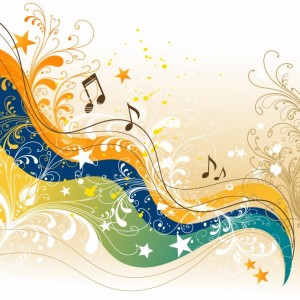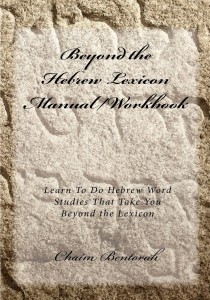Psalms 118:14: “The Lord is my strength and song and is become my salvation.”
I remember years ago we used to sing a little chorus based upon this verse. I remember my spirit was always quickened when I heard the words the Lord is my song. Until now, I never really stopped to consider what that meant or why my spirit rejoiced when I heard that the Lord was my song. I am beginning to learn that my spirit seems to understand things long before I do.
I often say that my studies in Hebrew are not revelational but conformational. People do not declare that I have given them any new revelation from my Hebraic study but that I only confirm what Christians have long believed in their spirits but could never really find any solid support in Scripture. I usual find that Scriptural support in the Hebrew.
In my own personal experience I often find that my studies of Scripture in the original languages allow my flesh to catch up with my spirit. So I approached this verse knowing that the Spirit of God is trying to tell my spirit something and maybe in studying this out in the Hebrew I might discover what it is.
It is the word song that really captures my attention. To celebrate the release of my new manual to accompany my book Beyond the Lexicon which offers the opportunity for anyone with no background in Hebrew or who feels they have no language ability to do a Hebrew word study. This is a dumb down version of our other manual which offers CD audio instruction and a CD ROM with an interlinear and lexicon. This manual has no CD’s, no CD ROMs and totally avoids any grammar. It is for those who just want to do a word study and not get into the complexity of all those Piels and Puals. It is a simple six step instruction in how to do a Hebrew word study using the resources you can find online. The following is an example of a word study I did using our new word study manual which you can now order off of Amazon (see below for more information).
The first step is to identify the Hebrew word in an interlinear found online. I discover there are many words for song in Hebrew but the word used for song in this passage is zamar. I then go to the BDB (manual will explain this) where I discover an absolutely fascinating history of this word as I trace it through its Semitic origins (also explained in the manual). This word zamar means a pruning hook. Now I spent some time on the internet searching through the history of a pruning hook and what it is. I discover that the meaning of this word gradually evolved to mean a song because the pruning hook is shaped like a scythe. This curved blade was mounted on a pole and used to cut away the dead wood and branches of a tree. Even today you will find our pruning instruments are little changed from ancient times; they have a curved blade attached to a pole. Eventually the pruning hook became a weapon used by Persian soldiers to pull another soldier off his horse.
So what does that have to do with song? In my online research I discovered that a skilled farmer would swing his pruning instrument back and forth from branches to branches and it would make sort of a whistling, rhythmic noise. As the object of pruning is to cut away the bad and leave the good, this word was used to express a song of triumph, victory and salvation from one’s foes. Thus, the Lord is my strength and my song of victory. It is a song that declares that the Lord has removed all the bad things from my life and left only that which is good and brings me to victory.
We have now reached the fourth step in our manual and here I must reference my book Beyond the Lexicon which is associated with the manual for more detail. What we will do now is to study the word zamar or song letter by letter. When you do this you find something even more profound. The word zamar is spelled: Zayin, Mem, Resh. The Zayin looks like a sword and indeed does mean a sword or weapon. The sages used to say that the Zayin cuts away all that is really unimportant to us and leaves only that which is important. Thus, this song is a song of what is most important to us. David says his song is God, it is God that is the most important thing in his life and the Zayin cuts away or prunes away all that is unimportant so that he can see what is important which is God.
So what is this song that sings of what is most important to us? This song is sung with the next letter which is the Mem. The Mem represents water. The Mem also represents the revealed knowledge of God. When you dive into the sea, water completely surrounds you. When you sing this song it is a song that surrounds you with the revealed knowledge of God. This is not your traditional victory or fight song like On Wisconsin. It is a song that speaks of God and his love and in singing this song you become completely surrounded by the presence of God who is revealing Himself to you.
The last letter in this word for song is the letter Resh. The Resh comes to us with the convicting power of the Holy Spirit. The Resh speaks of the Holy Spirit who enlightens us to the things that need to be cut away or pruned from our lives so that we can see what is important. The Resh speaks to us of repentance, the turning away from our sins or those thing that keep us from seeing what it really important to us which is God.
When we sing this song or this zamar we are singing a song that surrounds us with the knowledge of God. When we see only Him we throw off all that keeps us from him through repentance and the Zayin cuts it out of us, prunes us and leaves only our love for God.
Now we come to lesson five in our manual and that is to look at the numerical value of the word zamar. In our manual and book we find that the Zayin equals 7, the Mem equals 40 and the Resh equals 200. The total value of the word zamar is 247. Is there another word in the Hebrew that equals 247. Our manual then takes you to our website where we provide a link to a data base where you just type in the number 247 and it will show you all the words in the Hebrew Bible that equal 247. I discover that the Hebrew word mazaqaq also has a numerical value of 247. The sages teach if two Hebrew words have the same numerical value the Spirit of God may show you a relationship between these two words that will be of significant spiritual value. Mazaqaq means to refine. For me when I sing or listen to a zamar which for me is often a song of praise and worship, the Lord is performing a refining process in me, stripping or pruning away all that dross, those things that separate me from Him and in my praise and worship, my zamar I am left with only Him.
So gang, go on line and order our new simple to use manual and book Beyond the Lexicon and you too will be doing Hebrew word studies the day you receive the manual and if you love the Word and God enough, He will reveal His secrets to you.
Oh, by the way our new book being published by Harper Collins, Hebrew Word for Today, is now on Amazon for pre-order. If you plan to purchase this book please do it now so our publisher will really be impressed with our book sales. We do not ask for financial support from our friends as we do not want to cut into your tithes and offerings to your church so we are supported totally through our books sales.
CLICK HERE FOR MORE INFORMATION http://www.amazon.com/Beyond-Hebrew-Lexicon-Manual-Workbook/dp/1508601062/ref=sr_1_6?ie=UTF8&qid=1428671661&sr=8-6&keywords=chaim+bentorah
ALSO CHECK OUT OUR NEW DEVOTIONAL BOOK FOR PRE ORDER AT:
(They are working on the new cover :-) )
Thank you so much for your support…you are appreciated!










As a teen, my responsibility was to clean the creek banks using the scythe. There was a rhythm to the swinging of scythe and the way to move your body as in a dance. If you would let the scythe go through its natural motion it seemed almost effortless. As it passed through the weeds, it did have a sound which told you when it was sharp or dull. I carried a wet stone to sharpen the scythe which made a sound of its own. Revisiting the memories through God’s words, showed me He was talking to me even. God thank you for today, yesterday and hope of tomorrows.